Every morning, I passed Aisha on the sleepy sand streets of Bodufolhudhoo Island. Her black head scarf and ankle-length cloak revealed only her face and hands. I longed to speak to her, but after greeting me with a radiant smile and a heartfelt “Good morning,” she always lowered her eyes demurely and continued on her way. Like all the women in the Republic of Maldives, she seemed painfully shy.
On day four, I finally screwed up enough courage to ask her a question. “Can you tell me what your head scarf is called?” After she explained that the scarf was called a hijab and the cloak an abaya, I blurted out the question I’d wanted to ask for years. “Aren’t you hot?” I had long wondered whether the traditional clothing worn by Muslim women made them hot or was cooling because it afforded protection from the relentless sun.
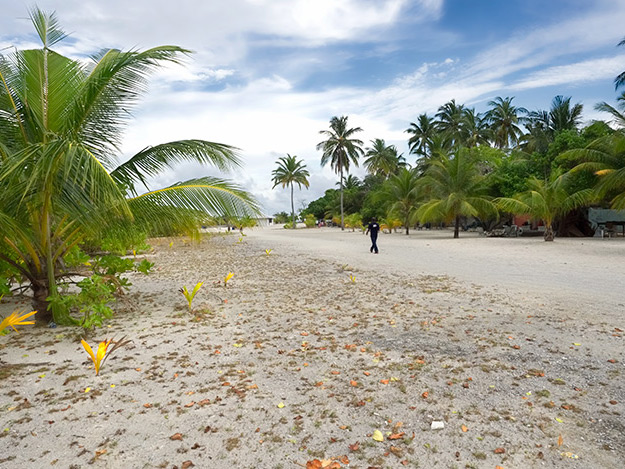
“No, I’m not hot,” she claimed, even though perspiration beaded her chin and upper lip. We stepped into the shade, where Aisha explained that the Quran, the holy book of Islam, states that women should cover themselves so as not to offer temptation to men. Efforts to remain chaste begin at an early age in the Maldives.
Though I’d previously understood that girls begin wearing the hijab and abaya after the beginning of menses, Aisha donned the traditional garb around the age of six. “I cried and cried. I didn’t want to wear it. But my father explained it was necessary because only my husband, brothers, and father should be allowed to see my body. He was protecting me so that he could deliver me to my future husband as a pure virgin. Today it is a pleasure to wear it! By doing so I honor the scripture and my husband.”
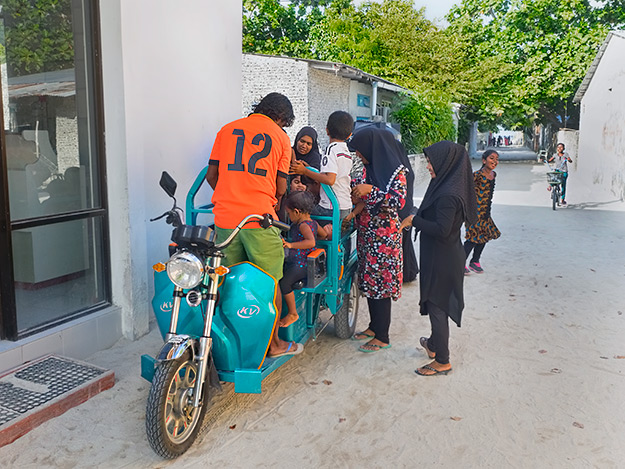
Now 20, Aisha has been married about a year and a half. Like most Maldivians, hers is a “love” marriage, rather than one arranged by her family. Even in the case of an arranged marriage, young women, who must be at least 18 years of age to marry, can turn down a candidate. Women in the Maldives are never forced into marriage. In Aisha’s case, her now husband asked her parents for permission to marry. Since he was deemed to be of good moral character and able to support Aisha, permission was granted. After the marriage ceremony, she moved in with her husband’s family, as per tradition.
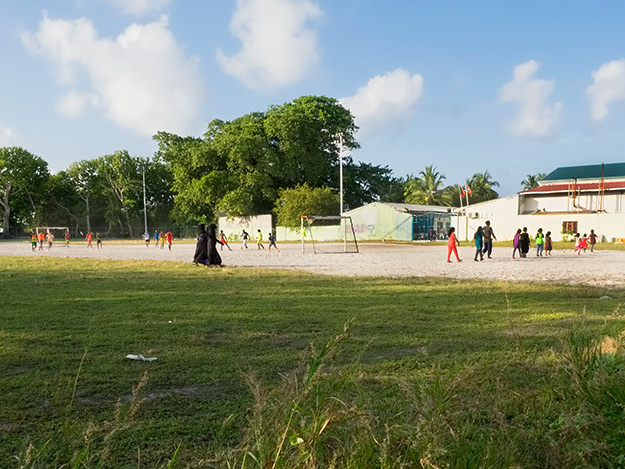
“Now that I am married, I must ask my husband for permission to do anything, even to visit my family,” she said. But then she grinned mischievously and added that he would never withhold permission, because he knows how important family is to her. Indeed, the “asking permission” part seems more custom than hard and fast rule. After marrying, Aisha lived alone for a year in the capital city of Malé, some 52 miles distant from Bodufolhudhoo, where she completed her advanced studies. She is currently pursuing her Bachelor’s degree in education online. Many of the women on the island work full time and both boys and girls are encouraged to pursue education as far as possible.
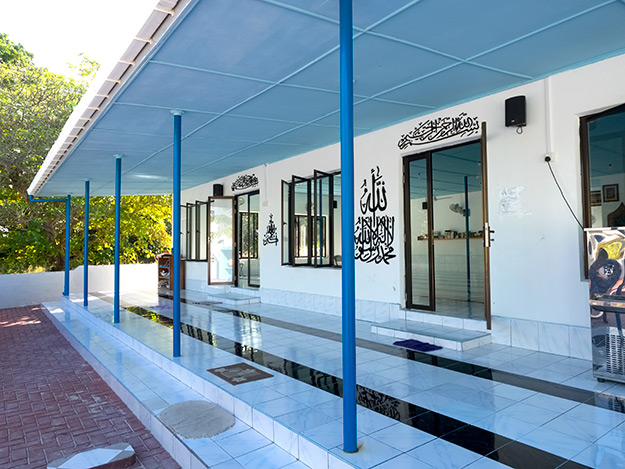
I toured the island later that week with Aisha. After a stop at one of two mosques, we popped into the local school. Education on the island goes to grade 10, with male and female students attending school together. At the Health Clinic and pharmacy, I spotted the island’s only car, an ambulance. Since there is no hospital on the island, I was perplexed. She explained that if someone falls sick, the ambulance picks the patient up and transports them to the clinic for treatment. If the condition is too serious for the clinic to handle, the patient is transferred by boat to the hospital, which is located on the administrative island for the Alif Alif Atoll group, within which Bodufolhudhoo lies.
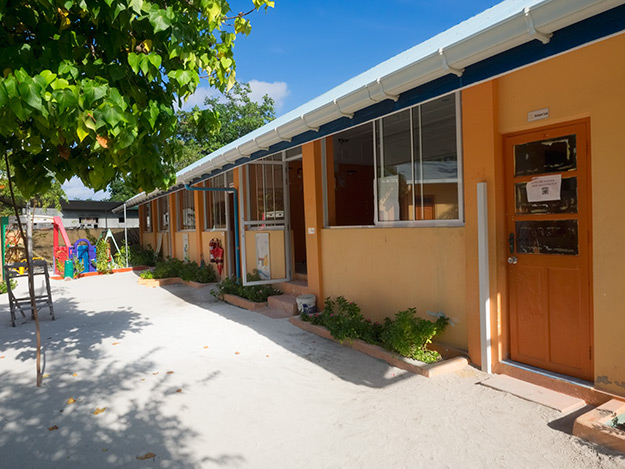
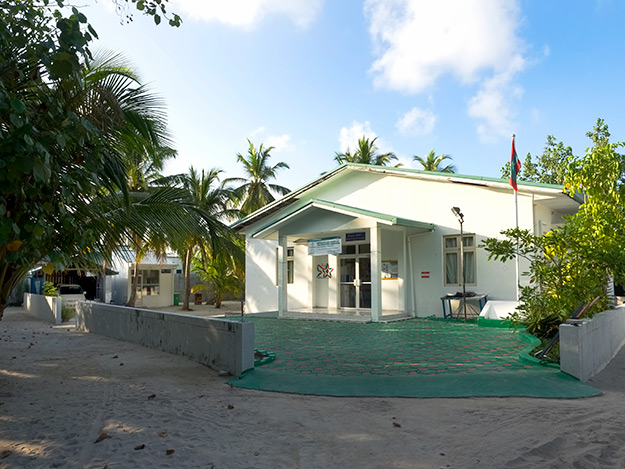
Aside from the mosques and school, the handful of sand streets on this .2-square mile island are home to a government council house and magistrate court, five guest houses and resorts, two restaurants, three convenience stores, an electrical power generating plant, a football (soccer) field, a children’s park, a large harbor, and an abandoned helicopter landing pad. There are also facilities for recycling and incineration of trash.
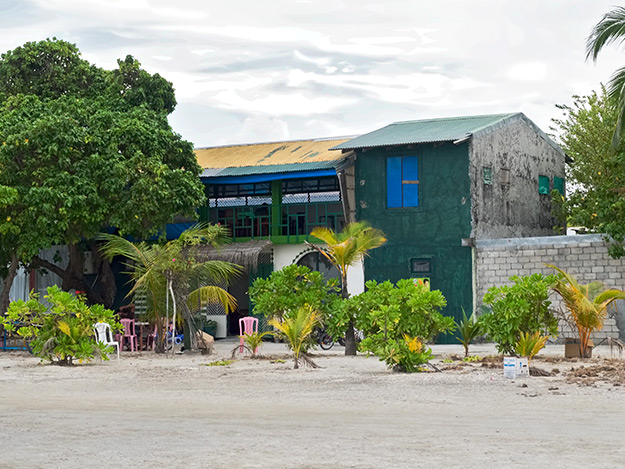
Of course, there are also beaches, which, considering the conservative dress code, could have presented a problem when tourists began to discover this sleepy island paradise. But the island fathers cleverly set aside a portion of beach for tourists and screened it off from the rest of the community. Upon arrival, I was told that wearing a bikini on Sunset Beach was perfectly acceptable, but that I should cover up before leaving the beach. Basically, I needed to cover everything from my upper arms to slightly above my knees. I thought it was an inspired solution, and “Bikini Beach,” at the locals call it, was a beautiful strip of white sand and crystalline turquoise seas.
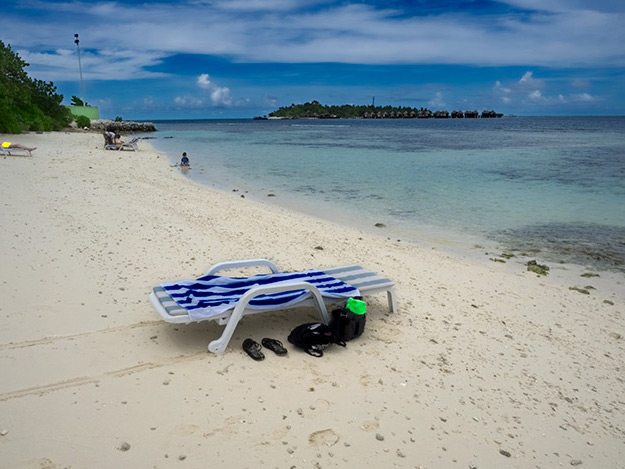
Beauty often comes with a price and Bodufolhudhoo is no exception. As the lowest country in the world (the top elevation on Bodufolhudhoo looked to be about six feet), it will be the first landmass to disappear as global warming continues to melt the polar icecaps. Even without climate change, the Maldives are in a tenuous situation. Though Aisha claimed that severe storms never cause overwash, two tsunamis have inundated the island in her lifetime. The first, which occurred when she was a young girl, caused severe damage to all the homes and businesses, but the flood waters miraculously parted around the mosque, where residents had taken refuge.
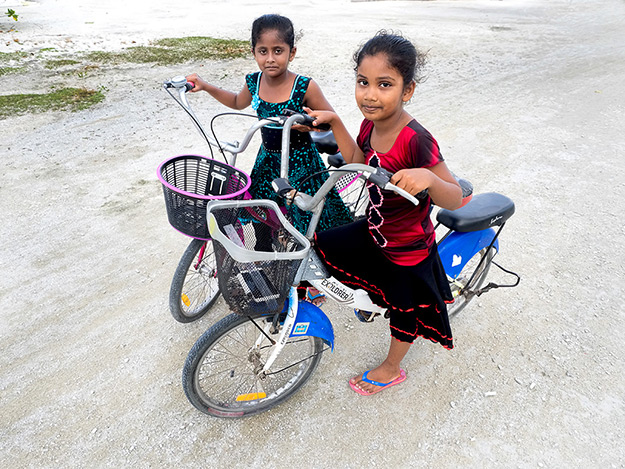
The most recent tsunami, caused by the Indian Ocean earthquake of December 2004, again caused destruction, but Bodufolhudhoo was more fortunate than most. Fifty-seven islands sustained serious damage, fourteen islands had to be evacuated, and six were totally destroyed. Only nine of the approximately 200 inhabited islands in the Maldives were spared from flooding. No one seems to know the fate of all 1,192 of the coral islands that make up the Maldives after the most recent tsunami.
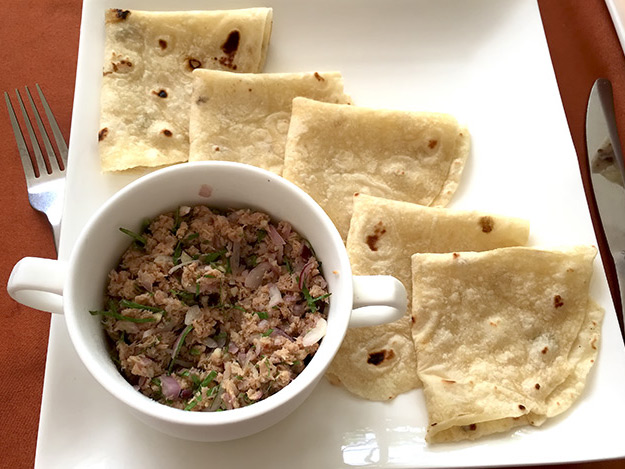
That evening, at Manta Inn, the locally owned guest house where I was staying, I picked clean the bones of my fresh-caught Red Snapper and ruminated about the culture of the Maldives. I could have taken any number of tours – diving, snorkeling, or visits to uninhabited atolls with pure white sand crested by coconut palms. But I had been more interested in learning what it’s like to actually live in such a place.
Still, it seemed the more I learned, the more questions I had. There isn’t a graveyard on the island, so what happens when someone dies? It was obvious that no vegetables grew in the barren sand, so where do the potatoes, red cabbage, peppers, carrots, and onions that I was constantly served come from? There is no police department or fire department. What happens if there is a crime or a fire? And with no bank, how do they conduct financial matters?
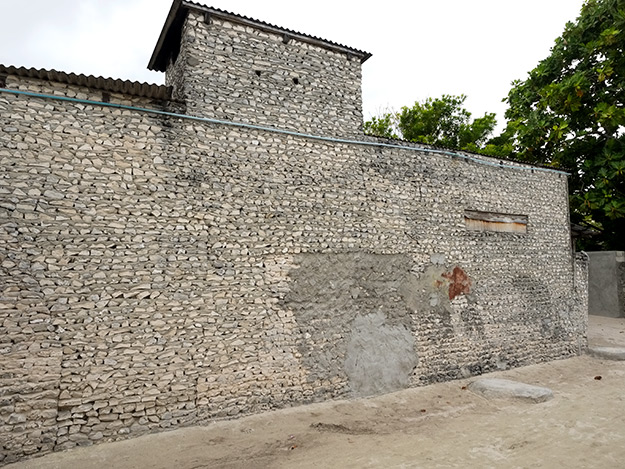
On my final day I remarked to Aisha that I couldn’t spend my whole life on a tiny speck of sand in the middle of the Indian Ocean. “I love it!” She insisted. “I love the silence when I step outside at night. There is no noise from cars and by day the only sounds are the birds chirping and the call to prayer five times a day.” There is something to be said for that kind of peace, but I’m afraid I need more stimulation than 630 residents could provide, and a decent coffee shop.
But while I wouldn’t want to live there, Bodufolhudhoo was the perfect mix of relaxation and cultural immersion. As the fast speedboat to Malé sped out of the harbor, I glanced at the luxurious bamboo huts perched over a turquoise bay on a nearby island. I smiled to myself, knowing those pricey resorts could never have provided me with the rich experience I’d enjoyed on Bodufolhudhoo.
Author’s note: Since the Maldives can be an expensive destination, you may find this article about how to visit the Maldives on a budget helpful. Also, I have changed Aisha’s name, at her request, to protect her true identity. However, all other information in my article is factual.

Hi Barbara,
you’ve missed Sri Lanka. Why didn’t you travel wonder of Asia? nice post thankyou.
jhone
That’s an interesting point about the arranged marriage. I didn’t think the women had a choice in the matter, let alone be able to turn it down. Considering Aisha’s marriage is ‘for love’, she married very young. Or is that normal in the Maldives?
Hi CJ: My experience in countries that still practice arranged marriage is that women normally have a choice whether or not to marry the husband chosen for her by the family. However, pressure generally mounts if the woman rejects too many candidates.
Very big difference between west and some conservative culture. . Hope Dear u don’t blame Islam for that because in Islam the Virgin ( who never get married ) they must consider her choice and opinion without forcing her this is Mohamed peace be upon him words ..my high respect
Maldives is like a ‘pearl of jewls’ like island-nation, located in Indian ocean, many discerning travellers called it Paradise.Im from one of the exotic islands in south and printed Maldives in my Instagram page, with amazing posts which i took and post all by myself.ur article is appealing and I hope u visit Maldives yet again.but make sure to another exotic island like Maafushi could be your ideal choice.thank you…
Hi Ahmed: Lucky you, being from such a beautiful place. I will return someday, and perhaps I’ll choose Maafushi this time. Thanks so much for the suggestion.
Island life fascinates me and I always have lots of questions like you. The Maldives look both beautiful and fascinating so hopefully I’ll make it there one day.
It’s a wonderful destination with really friendly, authentic people, Anne. Hope you make it there one day.
Fascinating look into everyday life on this vaunted luxury travel destination … thanks for going to great lengths to cobble together this story!
Thank you Walter! The older I get, the more I am interested in learning about different cultures. So happy you enjoyed the article.
Hi Barbara
Thanks for this excellent writing about my beautiful island. As a resident of this Island I would like to clarify some of the question you have mentioned in your article.
We do have a burial ground, it’s right next to the main mosque. As you have mentioned there are now police or fire department present in the island. But as a close knitted Muslim society we have moral responsibility to toward our fellow residents to protect each other, hence the crime rate is almost nill. In an event we require police presence they are sationed in a nearby island reachable by speedboat in just 10mins.
During natural disasters or fires, there is a trained community response group operated by the island council.
We do grow certainly fruits and vegetables in our island. But mostly they are imported from Malé. We have daily trips from the island to Malé by speedboat and dhoni, so its not a major issue in getting required supplies.
With regard to banking, the main store in the island(UC-Biz) provides cash widthrawal and depositing service of the Main bank. Bank of Maldives, they do accept major credit and debit cards. Also the bank dhoni visits the island once every month to provide banking services.
Once again thanks for this excellent piece of writing, and hope to see you back again enjoy the peace and beauty of our small community.
Thank you so much, Almode, for sharing that information. I was just fascinated by your wonderful island.